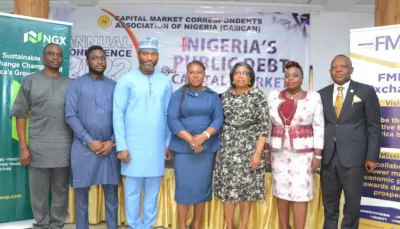Why Nigeria Won’t Default On Debt Servicing Despite Revenue Shortfalls

However, in view of grave revenue challenges, the government agency called for urgent measures to moderate further borrowings to stave off pressure on debt burden and sustainability.
Speaking at the annual workshop of the Capital Market Correspondents Association of Nigeria (CAMCAN) with the theme “Nigeria’s Public Debt and the Capital Market,” DMO Director General, Patience Oniha, explained that 60 percent of the government’s external debt is long term and the cost is below 3 percent per annum.
She noted that an extremely high ratio of debt service to revenue is an indication that urgent steps needed to be taken to boost nation’s revenue and enhance public debt sustainability.
Nigeria’s public debt stock has grown consistently over the past decades and even faster in recent years. Consequently, debt service has continued to grow.
She admitted that Nigeria’s low revenue base is compounded by dependence on crude oil which has resulted in budget deficits over the past decades.
She however said efforts at increasing non-oil revenue are yielding positive results.
“Dependence on borrowing and low revenue base is now threatening debt sustainability. With a low debt to GDP ratio, Nigeria’s debt service to revenue ratio would have been low if revenue was strong,” Oniha told capital market reporters.
She stressed the need for more efficient tax administration, plug revenue leakages, improves tax administration, and shore up non-oil revenue sources.
Revenue challenge, she said, remains one of the most critical fiscal policy issues currently threatening the nation’s debt sustainability, pointing out that outlook of both the local and international markets are becoming tighter with rising interest rate.
She, therefore, called on the authorities to urgently moderate new borrowings for its debt to remain sustainable, accelerate its revenue base to shore up non-oil revenue, and rationalize expenditure.
According to her, most countries around the world have placed more emphasis on taxation as a principal source of funding for the government while the reverse is the case in Nigeria.
Aside from taxation as a source of revenue generation, Oniha stated that borrowings must be tied to projects that would generate commensurate revenues to service loans used to finance the projects.
She also said that physical assets such as idle or under-utilised properties could be redeveloped for commercialisation to generate revenue.
Speaking on initiatives and activities for debt sustainability, Oniha said that Nigeria deploys debt management tools of the World Bank and IMF that enable debt sustainability.
She noted these tools include an annual Debt Sustainability Analysis (DSA) and a Medium Term Debt Management Strategy (MTDS) every four years.

